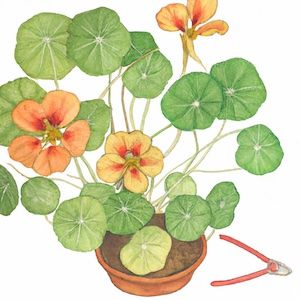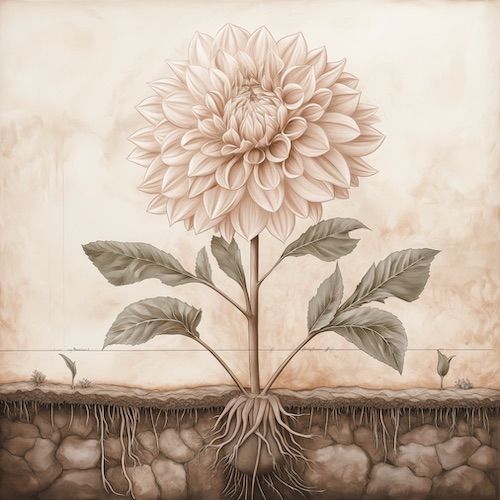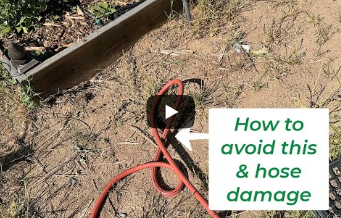Nasturtiums, with their vibrant blossoms and culinary versatility, truly deserve a place in both your garden and kitchen. Their widespread popularity isn’t just because of their aesthetic appeal but also because of the myriad benefits they offer. Here’s a deeper dive into the world of the brilliant nasturtium.
1. The Beauty of Nasturtiums
Nasturtiums are undeniably a visual treat for any garden. With their gorgeous, funnel-shaped flowers that range from dreamy creamy whites to fiery reds, they’re a magnet for both eyes and butterflies. Their intriguing water lily-like leaves further accentuate their allure, making them an evergreen favorite for garden enthusiasts. What’s even more exciting is that these colorful blooms are more than just lookers.
A Visual Delight Nasturtiums stand out with their bright blossoms contrasted against the backdrop of their unique leaves.
Low Maintenance, High Impact Gardeners especially love nasturtiums because they don’t ask for much. They gracefully grow, spreading their charm even in less-than-ideal conditions.
2. Culinary Uses of Nasturtium
Nasturtiums are more than just garden beauties; they’re a flavorful addition to your culinary creations. These flowers and leaves have been a secret ingredient for many chefs, adding a zesty punch to salads, appetizers, and even main courses.
Edible Flowers Not only are they beautiful to look at, but nasturtium flowers also pack a peppery flavor that can elevate a simple salad to a gourmet dish.
Tasty Leaves Beyond the flowers, the leaves are a delicious treat. Try them in sandwiches or as unique garnishes for a burst of flavor.
Seed Capers Don’t throw away those mature seeds! When pickled, they serve as a delightful alternative to capers.
3. Health Benefits and Medicinal Uses
For centuries, various cultures have turned to nasturtiums for more than just their beauty. With their rich nutrient content and potential medicinal properties, these plants have been revered as a natural remedy for certain ailments.
Rich in Vitamin C Nasturtiums can be a natural source to boost your daily vitamin C intake, which is essential for a robust immune system.
Antibacterial Properties Research has hinted at nasturtium’s natural antibacterial prowess, making them an interesting study in the world of natural remedies.
Respiratory Relief From days of old, nasturtiums have been used in folk medicine as a possible relief for respiratory challenges.
4. Gardening Benefits Natural Pest Deterrent
Nasturtiums aren’t just beautiful and beneficial for humans; they’re a guardian for other plants in your garden. By planting nasturtiums strategically, you can ward off unwanted pests that often wreak havoc on your precious greens.
Sunlight is Essential For a thriving nasturtium plant, ensure it receives its daily dose of sunlight, ideally between 4-6 hours.
Well-Drained Soil Though they’re not fussy, nasturtiums will appreciate a well-draining patch of land to call home.
Minimal Fertilizers Remember, when it comes to fertilizers, a little goes a long way for these plants.
Conclusion
In the vast world of gardening and botany, nasturtiums stand out as both a gardener’s delight and a chef’s treasure. Their multifaceted nature makes them indispensable, whether you’re crafting a dish or designing a garden layout. If you haven’t introduced these beauties to your space yet, it might be time to do so. Happy gardening!
Note: While nasturtium has various potential benefits, always consult with a professional before using any plant for medicinal purposes.
Nasturtium FAQ
Q1. What is a nasturtium? A nasturtium refers to a genus of roughly 80 species of annual and perennial herbaceous flowering plants in the family Tropaeolaceae. They are known for their vibrant flowers and round, lily-pad-like leaves. The most commonly cultivated species for gardens is Tropaeolum majus.
Q2. How do I plant nasturtium seeds? Nasturtium seeds can be sown directly in the ground or in pots. They prefer well-draining soil and full sun to partial shade. Sow the seeds about 1/2 inch deep, spacing them about 10-12 inches apart.
Q3. How long does it take for nasturtium seeds to germinate? Typically, nasturtium seeds will germinate within 7-14 days after sowing, depending on the soil temperature and conditions.
Q4. Do nasturtiums need a lot of water? Nasturtiums are relatively drought-tolerant plants. They prefer regular, moderate watering. Overwatering can lead to fewer flowers and more foliage.
Q5. Are nasturtiums edible? Yes! Both the flowers and leaves of nasturtiums are edible. They have a peppery taste, similar to arugula or watercress, and can be added to salads, used as garnishes, or incorporated into various dishes.
Q6. Why are my nasturtium leaves turning yellow? Yellowing leaves can be a sign of various issues, including overwatering, underwatering, or a nutrient deficiency. It’s essential to monitor watering habits and ensure proper drainage. If necessary, a balanced, water-soluble fertilizer can be applied.
Q7. Are nasturtiums perennial or annual? Most commonly grown nasturtiums, like Tropaeolum majus, are annuals, meaning they complete their lifecycle in one year. However, there are some perennial species in cooler climates.
Q8. How do I save nasturtium seeds for next year? As the flowers fade and seed pods form, wait for the pods to dry on the plant. Once dried, you can pick them, remove the seeds, and store them in a cool, dry place until the next planting season.
Q9. Do nasturtiums attract pests? Nasturtiums can sometimes attract aphids, but they’re often grown as companion plants in vegetable gardens because they can act as a trap crop, luring aphids away from more valuable plants.
Q10. Can nasturtiums grow in pots? Absolutely! Nasturtiums can thrive in pots or containers, making them perfect for patios, balconies, or areas with limited garden space.
We hope this FAQ helps you get started with growing and enjoying nasturtiums in your garden!
You can read more on the health benefits here: Nasturtium Health Benefits
More From Our Master Gardener
Recent Posts

The Ground Up Method: Building Plant Health from the Foundation

Origins of the Christmas Tree – A Journey Through History

Poinsettia: The Iconic Holiday Plant and How to Care for It

Air-Purifying Houseplants – Natural Solutions for Cleaner Air

December Gardening Checklist – Essential Winter Tasks for Every Gardener














